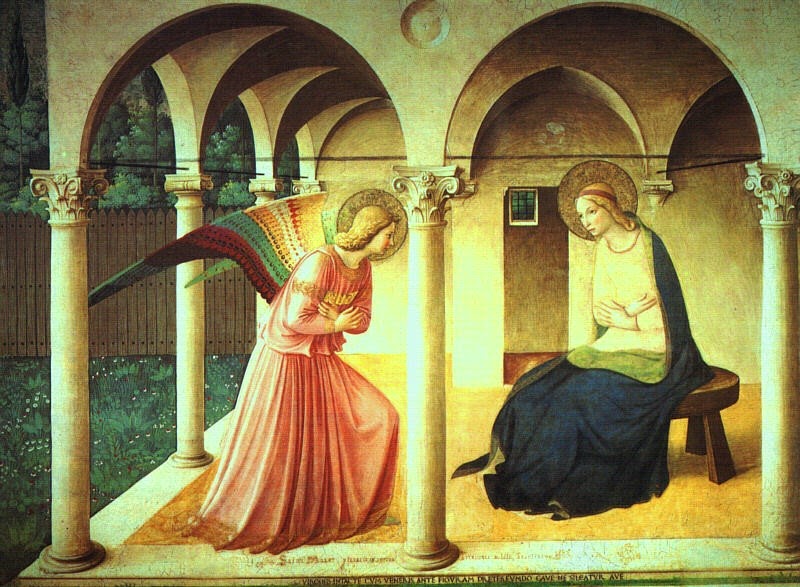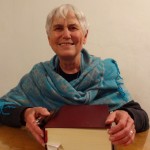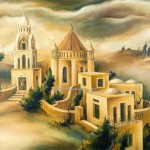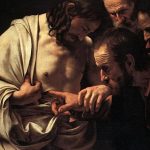
4th Sunday of Advent (Commentary)
Christmas is very close, and of course the liturgy of this fourth Sunday turns our eyes to David, the ancestor of the Messiah and of Mary who welcomed him in the name of all of us.
In the Book of Samuel, we see a well installed David who now wants to install God. The Lord does not need a dwelling place. Though he built the Temple, Solomon had understood this: Would God dwell on the earth among humans, this God whom the heavens and the heaven of heavens cannot contain, so even less this house that I have built? But humbly, the Lord let it be done to him. God knows that we need a tangible sign of God’s presence. The Temple won’t limit God, but it will be the privileged place of encounter. Nevertheless, God will also build another kind of house, one that is indestructible, a dynasty that will lead to the Messiah, whose reign will have no end. And thus we come to Nazareth in Galilee: a region: Galilee; and a town: Nazareth. Everything has a name, even the angel Gabriel; a woman: Mary; a man: Joseph who is precisely of the house of David. We meet the angel Gabriel in the Book of Daniel in the context of a messianic proclamation. It is also Gabriel who will announce to Zechariah the birth of John the Baptist.
The angel is sent to a “young girl”. The Greek parthenos translates three words in the Hebrew Bible: alma, a young woman, neara, an adolescent girl, betula, a virgin. Mary is a young woman who is not yet married. The angel greets her: Kaire, rejoice. This is no banal greeting like “hello” or even the “shalom” that is customary in meeting someone. Behind this word, we can hear the prophets: Zephaniah 3; Zechariah 9; Zechariah 2; Isaiah 12. Rejoice, daughter of Zion, exult Jerusalem, your king is coming to you, he is in your midst, as he himself says (Zechariah 2): I will dwell in you: God comes ever closer.
Full of grace: In Greek it is karitomene: filled with what corresponds with the Hebrew hesed, covenantal love, the love that creates relationships. This word is used in the New Testament only for Jesus who is full of love and truth. Mary is filled with it – for ever and ever; there is no space in her being that is without this love.
Mary is troubled, as well she might be. Fear is a beautiful sentiment. It is what we feel when faced with something that goes beyond us, and this can produce a certain fear. That is why the angel says to her: Do not be afraid. And there follows the announcement: She will conceive a son whom she will call Jesus, God saves. The Emmanuel in Isaiah 7, with whom Matthew connects Jesus in the announcement to Joseph, is God-with-us as savior.
There then follow all the things that make this child who he is. In the background, many biblical memories crowd like a necklace, the pearls of which are linked harmoniously, in order to introduce Him who fulfills the Scriptures and the promise.
Mary asks: How will this come about, since I do not know man? This is not like Zechariah, who says: By what sign will I recognize that what has been told me will be fulfilled? Mary believes. She is not married, so how will she conceive? Does she already intuit that the child’s conception will not depend on the intervention of a man? This is her secret.
And the angel answers, again by referring to Scripture: The Holy Spirit will come upon you: the Spirit who presides over the creation of the world, who makes fruitful, who inspires the prophets and kings, and David in his psalms. The power of God will cover you with his shadow. How could we not think of the cloud that went with the Israelites in the desert (Ex 13:21-22), of the one that filled the Temple of Solomon at its inauguration (1 Kings 8), and before that, the tabernacle in the desert (Ex 40). The cloud is the preferential sign of God’s presence, for it hides the light while letting one sense it.
For nothing is impossible for God. After the announcement made to Sarah and Abraham (Gen 18), the mysterious messenger said in response to their astonishment: Is anything too wonderful for the Lord? Sarah was sterile, the couple was old, Mary is a virgin… Why are there all these births that do not conform with nature? Certainly not in order to exalt sterility or virginity, but in order to know the Lord as the one and only master of life, the master of the impossible, who is capable of overturnung the laws of nature which God himself instituted in order to bring about God’s plan of love.
Mary then said: I am the servant of the Lord; may it be done to me according to your Word.
The servant David says (2 Sam 7): Speak to your servant David. Mary is a servant. In the Bible, the title servant is given to privileged beings. The same word eved means both slave and servant. If a person serves a tyrant, he or she is a slave. If they serve God, they are free. The servant is the faithful righteous person who fulfills the will of God.
One might think that Mary is passive: may it be done to me. But no, Mary is extraordinarily active in offering herself for the fulfillment of the Word. Her life is coherent with the Word of God who became flesh in her.
If we now look at Psalm 89, it is very appropriate for the two main readings because it reminds us of the covenant with God, the establishment of God’s dynasty for ever, as well as through its beginning: Without end I will sing of the Lord’s love. For the Psalm is talking about hesed, the covenantal love which filled Mary, as well as the Lord’s extraordinary fidelity.
I would like to end by taking up again the thanksgiving in the second reading, which speaks of the mystery that was kept hidden and then revealed. Let us allow ourselves constantly to be surprised by this mystery, without ever becoming used to it.







